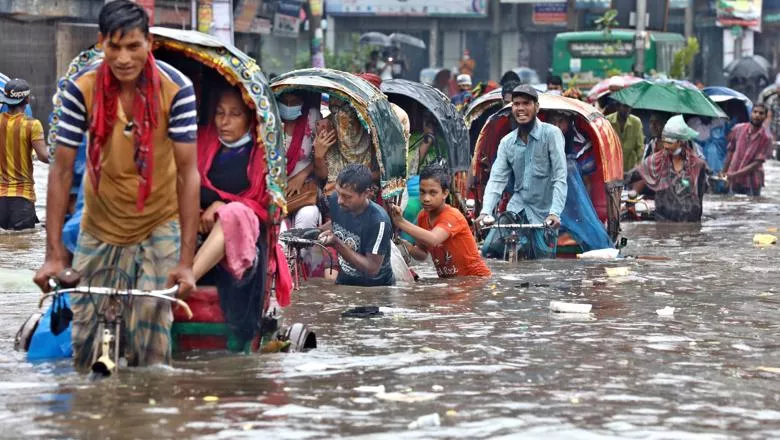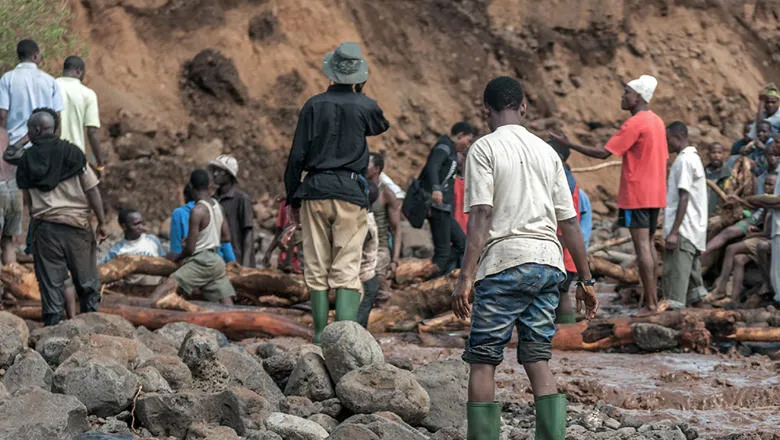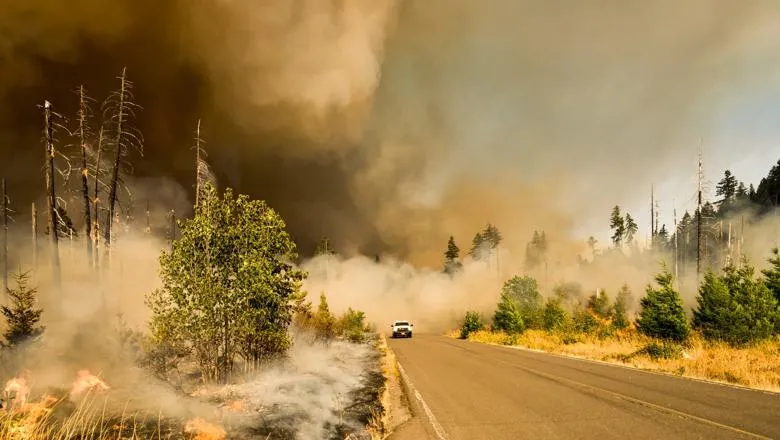The Centre for Integrated Research on Risk and Resilience (CIRRR) brings together researchers from across disciplines to explore transformational responses to climate risk reduction.
Drawing on resilience to understand the related social, political and economic underpinnings of the climate threats, CIRRR aims to improve entry points for policymakers and practitioners to engage in transformational adaptation pathways and local priorities to drive decision-making.
Objectives
CIRRR has three interconnected objectives:
- To drive vulnerability reduction by advancing local and Indigenous understandings of risk and resilience;
- To better connect policymakers and practitioners to knowledge on climate-related risks and transformational adaptation pathways;
- To improve understanding of novel, cascading and transboundary climate-related hazards.
Work streams
CIRRR's objectives are achieved by:
- Supporting, advancing and promoting locally-led research;
- Building effective engagement with the policy and practice communities on climate-related risk and resilience;
- Undertaking transdisciplinary research practices to advance understandings of risk.
CIRRR collaborates with other research centres at King’s, external partners, and NGOs to deliver its goals. We pursue research, academic teaching, professional training and education, networking and alumni events, public seminars and workshops, consultancy and advocacy.
Get in touch
CIRRR is based in the Department of Geography at King’s. We are interested in partnering with and supporting institutions working towards these objectives.
Projects

ACE: Anticipating unseen Climate Extremes
ACE is a UKRI Future Leaders Fellowship led by Dr Tom Matthews, and involving a team of interdisciplinary researchers, aiming to reduce risks from unprecedented (‘unseen’) climate extremes.

Lloyd's Foundation Project: Improving household preparedness in multi-hazard contexts
This project aims to better understand the factors that result in successful uptake of household preparedness plans, and better equip decision makers with the skills to incorporate natural hazard interrelationships in these plans. The work builds upon the Lloyd's Register Foundation World Risk Poll data. The project is currently being worked on by Primary Investigators Joel Gill (Cardiff University) and Faith Taylor (King's); and Postdoctoral researcher Peter McGowran (King's).
Publications
News
Helping humanity limit global warming can enable adaptation too, urges King's IPCC expert
The latest Intergovernmental Panel on Climate Change (IPCC) report outlines what the world can do to mitigate climate change – that is, what we can do between...

Geography academics lead authors on latest IPCC report: climate change affects all forms of life
Climate experts and Geography academics, Dr Helen Adams and Professor Mark Pelling are lead authors on the latest Intergovernmental Panel on Climate Change...

Events

Angry weather – attributing extreme events to climate change
Dr Friederike Otto, co-founder of World Weather Attribution, will discuss studies on estimating human influence on extreme weather events.
Please note: this event has passed.

CIRRR Christmas Lecture - Resilient cities: Risk, limits and thresholds
A discussion between Mark Pelling and CIRRR Directors Helen Adams and Tom Matthews will provide a critical take on some of the challenges to urban...
Please note: this event has passed.
Past Projects
Humanitarian Futures programme
An independent centre at King’s with a focus on knowledge exchange between science, community and policy makers on disaster risk management and climate change adaptation. This group has a strong international focus and broad interest in humanitarian policy and practice.
Building resilience against climate extremes and disasters (BRACED)
BRACED investigates the role of climate science in building resilience livelihoods in Burkina Faso and Ethiopia.
PEARL: Preparing for extreme and rare events in coastal regions
The PEARL project aims to develop adaptive risk management strategies for coastal communities, focusing on extreme hydro-meteorological events. It uses a multidisciplinary approach to integrate social, environmental and technical research and innovation. It also considers the fundamentals in the risk governance cycle, focusing on the enhancement of forecasting, prediction and early warning capabilities.
Landslide multi-hazard risk assessment, preparedness and early warning in South Asia integrating meteorology, landscape and society (LANDSLIP)
LANDSLIP is a large multi-team four-year project led by King’s and the British Geological Survey, focussed on reducing impacts of hydrologically-related landslide multi-hazards and building resilience to landslides in vulnerable and hazard-prone areas of India and South Asia.
Expressive Mapping of Resilient Futures (E-MoRF)
The Expressive Mapping of Resilience (E-MoRF) project aims to mainstream innovative, low-cost ways of representing these community voices on the map, coupled with simple ways for decision makers to incorporate this data into their existing systems to result in more inclusive planning for resilience. Led by Dr Faith Taylor, this work focuses upon mapping community perspectives of resilience.
Transformation and Resilience on Urban Coasts (TRUC)
This project examines the production and management of vulnerability to extreme events generated through large scale coastal urbanisation processes.
Urban Africa: Risk Knowledge (Urban ARK)
Urban Africa: Risk Knowledge (Urban ARK) is a three year research and capacity building programme, funded by the Department of International Development and the Economic and Social Research Council. Led by Professor Mark Pelling, the work seeks to open up an applied research and policy agenda for risk management in urban sub-Saharan Africa.
Deltas, vulnerability and climate change: Migration and adaptation (DECCMA)
The adaptive strategies available to deltas residents (eg disaster risk reduction, land use management or polders) may not be adequate to cope with pervasive, systematic, or surprise changes associated with climate change. Hence large movements of deltaic people are often projected under climate change. DECCMA is an approximately five-year programme of applied research on the adaptation options, limits and potential in deltaic environments to current weather variability and extremes, as well as climate change.
A forecast of the timing, locations, sequence and likeliest destinations of populations displaced by sea level rise and coastal extremes
The adaptive strategies available to deltas residents (e.g. disaster risk reduction, land use management or polders) may not be adequate to cope with pervasive, systematic, or surprise changes associated with climate change. Hence large movements of deltaic people are often projected under climate change.
Ecosystem Services for Poverty Alleviation (ESPA)
The overall aim of ESPA Deltas is to provide policy makers with the knowledge and tools that enable them to evaluate the effects of policy decisions on ecosystem services and people's livelihoods. This links science to policy at the landscape scale and engages national level policy processes that bring impacts to the community level.
Precarious Places: social cohesion, resilience and place attachment of refugees in Lebanon
Examining place attachment in refugees and their host communities to inform programming on social inclusion and conflict mediation.
Projects

ACE: Anticipating unseen Climate Extremes
ACE is a UKRI Future Leaders Fellowship led by Dr Tom Matthews, and involving a team of interdisciplinary researchers, aiming to reduce risks from unprecedented (‘unseen’) climate extremes.

Lloyd's Foundation Project: Improving household preparedness in multi-hazard contexts
This project aims to better understand the factors that result in successful uptake of household preparedness plans, and better equip decision makers with the skills to incorporate natural hazard interrelationships in these plans. The work builds upon the Lloyd's Register Foundation World Risk Poll data. The project is currently being worked on by Primary Investigators Joel Gill (Cardiff University) and Faith Taylor (King's); and Postdoctoral researcher Peter McGowran (King's).
Publications
News
Helping humanity limit global warming can enable adaptation too, urges King's IPCC expert
The latest Intergovernmental Panel on Climate Change (IPCC) report outlines what the world can do to mitigate climate change – that is, what we can do between...

Geography academics lead authors on latest IPCC report: climate change affects all forms of life
Climate experts and Geography academics, Dr Helen Adams and Professor Mark Pelling are lead authors on the latest Intergovernmental Panel on Climate Change...

Events

Angry weather – attributing extreme events to climate change
Dr Friederike Otto, co-founder of World Weather Attribution, will discuss studies on estimating human influence on extreme weather events.
Please note: this event has passed.

CIRRR Christmas Lecture - Resilient cities: Risk, limits and thresholds
A discussion between Mark Pelling and CIRRR Directors Helen Adams and Tom Matthews will provide a critical take on some of the challenges to urban...
Please note: this event has passed.
Past Projects
Humanitarian Futures programme
An independent centre at King’s with a focus on knowledge exchange between science, community and policy makers on disaster risk management and climate change adaptation. This group has a strong international focus and broad interest in humanitarian policy and practice.
Building resilience against climate extremes and disasters (BRACED)
BRACED investigates the role of climate science in building resilience livelihoods in Burkina Faso and Ethiopia.
PEARL: Preparing for extreme and rare events in coastal regions
The PEARL project aims to develop adaptive risk management strategies for coastal communities, focusing on extreme hydro-meteorological events. It uses a multidisciplinary approach to integrate social, environmental and technical research and innovation. It also considers the fundamentals in the risk governance cycle, focusing on the enhancement of forecasting, prediction and early warning capabilities.
Landslide multi-hazard risk assessment, preparedness and early warning in South Asia integrating meteorology, landscape and society (LANDSLIP)
LANDSLIP is a large multi-team four-year project led by King’s and the British Geological Survey, focussed on reducing impacts of hydrologically-related landslide multi-hazards and building resilience to landslides in vulnerable and hazard-prone areas of India and South Asia.
Expressive Mapping of Resilient Futures (E-MoRF)
The Expressive Mapping of Resilience (E-MoRF) project aims to mainstream innovative, low-cost ways of representing these community voices on the map, coupled with simple ways for decision makers to incorporate this data into their existing systems to result in more inclusive planning for resilience. Led by Dr Faith Taylor, this work focuses upon mapping community perspectives of resilience.
Transformation and Resilience on Urban Coasts (TRUC)
This project examines the production and management of vulnerability to extreme events generated through large scale coastal urbanisation processes.
Urban Africa: Risk Knowledge (Urban ARK)
Urban Africa: Risk Knowledge (Urban ARK) is a three year research and capacity building programme, funded by the Department of International Development and the Economic and Social Research Council. Led by Professor Mark Pelling, the work seeks to open up an applied research and policy agenda for risk management in urban sub-Saharan Africa.
Deltas, vulnerability and climate change: Migration and adaptation (DECCMA)
The adaptive strategies available to deltas residents (eg disaster risk reduction, land use management or polders) may not be adequate to cope with pervasive, systematic, or surprise changes associated with climate change. Hence large movements of deltaic people are often projected under climate change. DECCMA is an approximately five-year programme of applied research on the adaptation options, limits and potential in deltaic environments to current weather variability and extremes, as well as climate change.
A forecast of the timing, locations, sequence and likeliest destinations of populations displaced by sea level rise and coastal extremes
The adaptive strategies available to deltas residents (e.g. disaster risk reduction, land use management or polders) may not be adequate to cope with pervasive, systematic, or surprise changes associated with climate change. Hence large movements of deltaic people are often projected under climate change.
Ecosystem Services for Poverty Alleviation (ESPA)
The overall aim of ESPA Deltas is to provide policy makers with the knowledge and tools that enable them to evaluate the effects of policy decisions on ecosystem services and people's livelihoods. This links science to policy at the landscape scale and engages national level policy processes that bring impacts to the community level.
Precarious Places: social cohesion, resilience and place attachment of refugees in Lebanon
Examining place attachment in refugees and their host communities to inform programming on social inclusion and conflict mediation.
Our Partners
Contact us
Centre for Integrated Research in Risk & Resilience co-directors:






